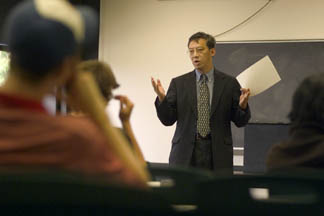Launching China and Asia-Pacific Studies, a 'revolutionary' new undergraduate major
By Franklin Crawford

Michael Zak '75 had the vision. Now Chen Jian, the Michael J. Zak Chair of History for U.S.-China Relations, has a dream. And between vision and dream comes Cornell University's China and Asia-Pacific Studies major (CAPS), the result of a lot of hard work by Sherman Cochran, among others. Cochran, the Hu Shih Professor of Chinese History, is CAPS director.
CAPS, according to Chen, is "a revolutionary program, unlike any other in this country, and, as far as I can see, unlike any in the world."
And Chen, according to Cochran, is "the pre-eminent historian of Chinese-American relations in the world."
It's not hype. It's pride. With an intense focus on acculturation through language learning, its semester-long externships to Washington, D.C., and Beijing and its rigorous programming, CAPS certainly is unlike any other major at Cornell or just about anywhere else.
Chen shared an Emmy Award for his work on a forthcoming documentary, "Declassified: Nixon in China." And it is clear to anyone who attended his first public lecture last week that his knowledge of U.S.-China relations is matched only by his passion for teaching the complex subject.
He closed his exhaustive discourse, "The China Challenge in the 21st Century: A Historian's Perspective," with a dream of the future: When he retires from academic life several decades hence, "and I look around and find in every area of encounter with China, a graduate of the Cornell CAPS program … that would be a real dream come true."

Chen's lecture was the centerpiece of a celebration of the Zak chair (read Zak profile) and the launching of the major this fall.
The phenomenal economic growth of China over the past three decades has placed the once-sleeping giant squarely in the forefront of international relations and the world economy. It is a country little understood by the average American, even the above-average American. This void was addressed by Zak, who in 2002 met with President Hunter Rawlings to outline a vision that was quickly embraced by Cochran and Cornell Professors Peter Katzenstein, Walter LaFeber and Theodore Lowi. Cochran then designed a course that required three years of intensive study of Mandarin before senior year (it is also the first Cornell major to require coursework off campus and overseas). Zak endowed a chair for the program. The next step was to fill it. One name stood out.
"The recruiting strategy could be summarized in three words," Zak said. "Get Chen Jian," then the C.K. Yen Professor of Chinese-American Relations at the University of Virginia. That, they did. Chen came, he said, because of the opportunities CAPS offered for improving U.S.-China relations and understanding.
Rawlings, who will go to Beijing next month to sign a CAPS agreement with Peking University, called the major "on-the-ground education."
Justin Long '08, one of the first three Cornell students to declare a CAPS major and with two years of Mandarin to his credit, is ready to hit that ground running. "If I were to take a standard Asian studies major, it would be more difficult to incorporate the off-campus work I am doing and the internships would be unavailable," Long said. "Also, CAPS stresses the achievement of high levels of competence in the Chinese language. I am most looking forward to my time in Washington and Beijing."
Here's a CAPS primer:
In Ithaca, CAPS majors study China's history, politics, society and foreign relations, especially with the United States, and they take Chinese language courses either in the regular curriculum or in FALCON (the Full-year Asian Language Concentration) -- the only language program in the United States that allows students to study Chinese all day, every day, year-round.
In Washington, D.C., CAPS majors are in residence at Cornell-in-Washington, and their core course is a seminar on U.S.-China relations. In it they have discussions with Americans who have worked in China in diplomacy, business, law, journalism, education and other fields.
In Beijing, CAPS majors will live on the campus of Peking University, among China's pre-eminent institutions of higher learning, and their key CAPS course is taught partly in Chinese and partly in English by a Peking University professor.
In both Washington and Beijing, CAPS majors hold China-related externships in government agencies, embassies, newspapers, television networks, businesses, law firms, nongovernmental organizations and other groups.
Back in Ithaca for their final semester, CAPS majors conclude their studies with a senior seminar taught by a professor in the program.
"Students who undertake a CAPS major must be highly motivated," Chen said. "They must take the initiative all the time."
Iris Zhang '08 is motivated by the study abroad component. Like Long, she has a bit of an advantage in the major she just declared: She's almost fluent in Mandarin.
"CAPS was the only program I could find that would allow me to study with Peking University professors in classes specifically for Cornell students," Zhang said. "When I told my parents about my decision to major in CAPS, I described it as a program that is truly unique and probably will be one of the top programs at Cornell in the future, if not top in the nation. Hopefully by the time I graduate, it will be."
Media Contact
Get Cornell news delivered right to your inbox.
Subscribe